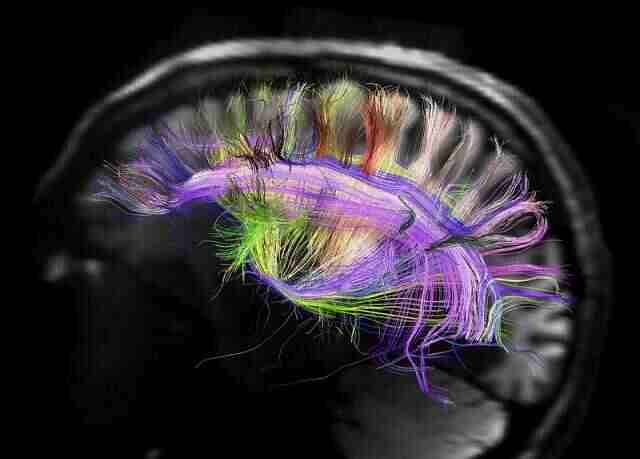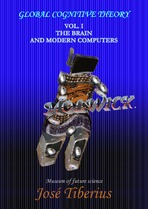1.b) Global Cognitive Theory
The Global Cognitive Theory focuses on the consequences of the General Theory of Conditional Evolution of Life of 1990. It analyses the information systems, the cognitive aspects of the brain, and the psychology of knowledge about neuroscience and evolution of the brain in modern culture.
Regardless of other possible points of view, according to the Global Cognitive Theory, there is no difference between the terms brain and mind, which does not mean denying the fundamental liberty of Life.
The digital books online of the Global Cognitive Theory are:
-
The Brain and Modern Computers
In the first title, there are some ideas about the logic of the human brain's activity and the physiological structure for its optimization.
The characteristics of intelligence and memory are in title II. The primary conceptual identity of both functions is stressed because one cannot exist without the other.
Other common aspects discussed are the necessity that both have for physiological support, their complementarity, and the continuous optimization the human intellect is subject to due to the complexity and flexibility of cognitive theory.
In title III, there are a series of practical implications or considerations about specific topics of evolutionary psychology regarding people, education, and the evolution of life.
-
Intelligence, intuition, and creativity
The following book discourses to the various concepts of as a knowledge manager:
The different forms of its internal functions, from the pre-concepts and automatic responses to those generated by logic and the system of language. The organization criterion chosen is the degree of reliability associated with the answers.
It presents an approach to creativity as groups of complex functions or packets of basic tasks supporting specific abilities of the brain.
The next step is to speculate on the physiological structure that is most apt to execute the required functions, its genetic nature, and how intelligence transmits to the coming generations.
The coherence of the proposals needs an additional element, how intelligence grows. It seems slightly complicated that it evolves and improves its efficiency through random mutations.
It will allow a better understanding of the different concepts, particularly about the terms used for relational and conditional intelligence.
Diffusion spectrum MR image of the human brain (MGH | UCLA | Human Connectome Project_science **| SINC) 
-
Memory, language, and other brain abilities
The third on-line book of the Global Cognitive Theory is dedicated to the different memory types, functional analysis, and its genetic base; giving rise to explanations about the power of language and other intellectual capacities and ideas as for how to improve memory and its limits.
The memory is the brain’s crucial second function. The cognitive theory of this intellectual capacity until now has not been as developed as that of intelligence; perhaps due to its complexity and types.
Language can be an example of this complexity and variability since it consists of the interaction of different types of intelligence and memory, which are present in many physiological and working processes of the brain.
The analysis comprehends the following main points:
Discussions on how to improve memory
Functional analysis during conscious cognitive processes
-
Special memories such as linguistics
Types of memory through their temporal perspective (short, medium, and long-term) and by their temporal persistence and reliability.
Management of information from the perspective of intelligence as a manager of knowledge
Unconscious mechanisms of compression, degradation, and reconstruction of data, and conscious optimization mechanisms.
The interaction between storing and managing information will produce the effects of complementarity between both intellectual abilities.
Consequently, the empirical research by the cognitive theory and neuroscience of the global efficiency in the management of information, and the possible genetic nature of memory and language will be more complicated than of intelligence; even with precise evaluation methods of the available data.
-
Willpower and artificial intelligence
The decision-making process does not appear in the functional diagram of the brain because it is more appropriate to make a philosophical approach to willpower than the other cognitive processes of the brain.
The critical aspects included in this book are:
The origin of ideas and thoughts
-
The brain intervenes in decision-making processes, but surely, the body’s cells are also involved; as if it was the expression of will autonomy through a decision-making system like a real political system.
This viewpoint of the decision-making model, along with its sensitivity, offers rational explanations for the changes produced in personal decisions without apparent reasons and, in some way, to derived problems such as schizophrenia.
-
The philosophical perspective allows comments on the very existence in the sense of existing as a unique individual, a vital impulse system of elemental individuals or a global collectivity, or alternating the forms above over time, moreover, according to the expression of will or the existence of a feeling.
A discussion about the active subject of will in decision-making processes offers two definitions of artificial intelligence; bringing together all the mentioned ideas about natural brain functions.
The basics of the evolutionary genetics of the Global Cognitive Theory and the empirical research carried out in The EDI Study are on the page the evolution of intelligence of the book Conditional Evolution of Life.
On the same page, the Darwinout experiment is proposed to confirm the results obtained with The EDI Study. Furthermore, the novel Menssalina experiment is more potent and straightforward than Darwinout.
